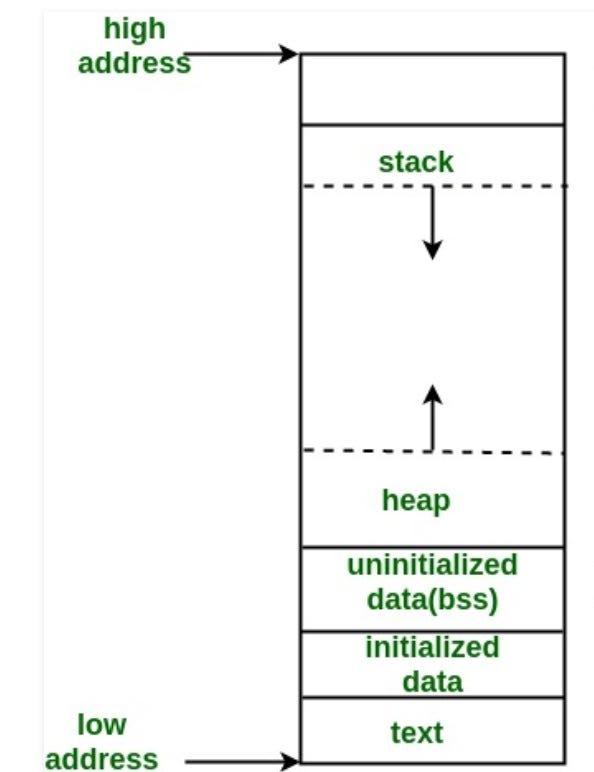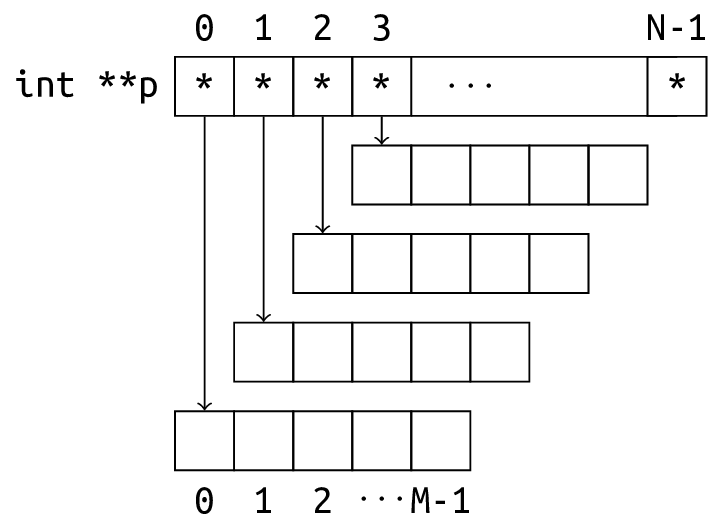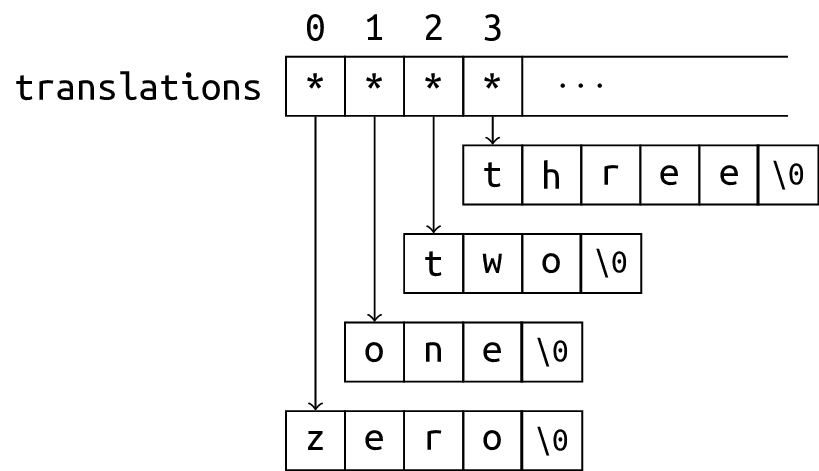CS100 Lecture 7
Pointers and Arrays III, Dynamic memory, Strings
Contents
- Pointers and Arrays
- Pointers and
const - The
void *type - Dynamic memory
- Strings
Pointers and Arrays
Recap: const variables
A const variable cannot be modified after initialization.
- It has type
const T(or equivalentlyT const), whereTis its original (unqualified) type. - Any direct modification to a
constvariable is not allowed.
The type of the expression &x, where x is of type const T, is const T *.
Pointer to const
A pointer to const is a pointer whose pointee type is const-qualified:
const int x = 42;
int *pi = &x; // Dangerous: It discards the const qualifier.
const int *cpi = &x; // Better.
The type of cpi is const int * (or equivalently, int const *), which is a pointer to const int.
const is a "lock"
const is like a lock, guarding against modifications to the variable.
It is very dangerous to let a pointer to non-const point to a const variable: It is an attempt to remove the lock!
- Warning in C, error in C++.
const int x = 42;
int *pi = &x; // Dangerous: It discards the const qualifier.
const int *cpi = &x; // Better.
++*pi; // No error is generated by the compiler, but actually undefined behavior.
Any indirect modification to a const variable is undefined behavior.
const is a "lock"
const is like a lock, guarding against modifications to the variable.
A pointer to const can point to a non-const variable: This is adding a lock.
int x = 42;
int *pi = &x;
const int *cpi = &x; // OK.
++*pi; // Correct, same as ++x.
++*cpi; // Error!
const is a "lock"
A pointer to const can also point to a non-const variable: This is adding a lock.
- A pointer to
constthinks that it is pointing to aconstvariable. Therefore, it does not allow you to modify the variable through it.
int x = 42;
int *pi = &x;
const int *cpi = &x; // OK.
++*pi; // Correct, same as ++x.
++*cpi; // Error!
Such constness on the pointee type is often called "low-level constness".
const can be helpful
It tells the compiler "this variable should not be modified!".
int count(const int *a, int n, int value) {
int cnt = 0;
for (int i = 0; i < n; ++i)
if (a[i] = value) // Error: cannot modify a[i]
++cnt;
return cnt;
}
[Best practice] Use const whenever possible.
We will see more usage of const in C++.
Top-level constness
A pointer itself can also be const. The type of such pointer is PointeeType *const.
- Such
constness is often called "top-levelconstness".
int x = 42;
int *const pc = &x;
++*pc; // OK.
int y = 30;
pc = &y; // Error.
A const pointer cannot switch to point to other variables after initialization.
A pointer can have both low-level and top-level constness:
const int *const cipc = &x;
void *
A special pointer type:
- Any pointer can be implicitly converted to that type.
- A pointer of type
void *can be implicitly converted to any pointer type. - This must happen explicitly in C++.
- Use
printf("%p", ptr);to print the value of a pointerptrof typevoid *. -
If
ptris a pointer of some other type, a conversion is needed:c printf("%p", (void *)ptr);
The C type system is weak. Many kinds of implicit conversions are very dangerous, although allowed by C.
void *
C does not have a static type system as powerful as C++'s. void * is often used to represent "pointer to anything", "location of some memory", or even "any object".
- Typically, the memory allocation function
malloc(see below) returnsvoid *, the address of the block of memory allocated. - Memory does not have types. - We say "a disk of 1TB" instead of "a disk that can hold \(2^{38}\)
ints".
Dynamic memory
A "dynamic array"
Create an "array" whose size is determined at runtime?
A "dynamic array"
Create an "array" whose size is determined at runtime?
- We need a block of memory, the size of which can be determined at runtime.
- If we run out of memory, we need to know.
- We may require a pretty large chunk of memory.
Stack memory vs heap (dynamic) memory
Use malloc and free
Declared in <stdlib.h>.
void *malloc(size_t size);
Allocates size bytes of uninitialized storage on heap.
If allocation succeeds, returns the starting address of the allocated memory block.
If allocation fails, a null pointer is returned.
size_t: A type that can hold the size (number of bytes) of any object. It is- declared in
<stddef.h>, and - is an unsigned integer type,
- whose size is implementation-defined. For example, it may be 64-bit on a 64-bit machine, and 32-bit on a 32-bit machine.
Use malloc and free
Declared in <stdlib.h>.
void *malloc(size_t size);
T *ptr = malloc(sizeof(T) * n); // sizeof(T) * n bytes
for (int i = 0; i != n; ++i)
ptr[i] = /* ... */
// Now you can use `ptr` as if it points to an array of `n` objects of type `T`
// ...
free(ptr);
To avoid memory leaks, the starting address of that block memory must be passed to free when the memory is not used anymore.
Use malloc and free
Declared in <stdlib.h>.
void free(void *ptr);
Deallocates the space previously allocated by an allocation function (such as malloc).
If ptr is a null pointer, this function does nothing.
- There is no need to do a null check before calling
free!
The behavior is undefined if ptr is not equal to an address previously returned by an allocation function.
Use malloc and free
Declared in <stdlib.h>.
void free(void *ptr);
Deallocates the space previously allocated by an allocation function (such as malloc).
The behavior is undefined if the memory area referred to by ptr has already been deallocated.
- In other words, "double
free" is undefined behavior (and often causes severe runtime errors).
After free(ptr), ptr no longer points to an existing object, so it is no longer dereferenceable.
- Often called a "dangling pointer".
Use malloc and free
We can also create one single object dynamically (on heap):
int *ptr = malloc(sizeof(int));
*ptr = 42;
printf("%d\n", *ptr);
// ...
free(ptr);
But why? Why not just create one normal variable like int ival = 42;?
Use malloc and free
Benefit: The lifetime of a dynamically allocated object goes beyond a local scope.
It is not destroyed until we free it.
int *create_array(void) {
int a[N];
return a; // Returns the address of the local object `a`.
// When the function returns, `a` will be destroyed, so that
// the returned address becomes invalid.
// Dereferencing the returned address is undefined behavior.
}
int *create_dynamic_array(int n) {
return malloc(sizeof(int) * n); // OK. The allocated memory is valid until
// we free it.
}
Use malloc and free
Create a "2-d array" on heap?
int **p = malloc(sizeof(int *) * n);
for (int i = 0; i < n; ++i)
p[i] = malloc(sizeof(int) * m);
for (int i = 0; i < n; ++i)
for (int j = 0; j < m; ++j)
p[i][j] = /* ... */
// ...
for (int i = 0; i < n; ++i)
free(p[i]);
free(p);
Use malloc and free
Create a "2-d array" on heap? - Another way: Create a 1-d array of length n * m.
int *p = malloc(sizeof(int) * n * m);
for (int i = 0; i < n; ++i)
for (int j = 0; j < m; ++j)
p[i * m + j] = /* ... */ // This is the (i, j)-th entry.
// ...
free(p);
Use calloc
Declared in <stdlib.h>
void *calloc(size_t num, size_t each_size);
Allocates memory for an array of num objects (each of size each_size), and initializes all bytes in the allocated storage to zero \({}^{\textcolor{red}{1}}\).
Similar as malloc(num * each_size). \({}^{\textcolor{red}{2}}\) Returns a null pointer on failure.
malloc, calloc and free
The behaviors of malloc(0), calloc(0, N) and calloc(N, 0) are implementation-defined:
- They may or may not allocate memory.
- If no memory is allocated, a null pointer is returned.
- They may allocate some memory, for some reasons. In that case, the address of the allocated memory is returned.
- You cannot dereference the returned pointer.
- It still constitutes memory leak if such memory is not
freed.
Arrays vs malloc
- An array has limited lifetime (unless it is global or
static). It is destroyed when control reaches the end of its scope. - Objects allocated by
mallocare not destroyed until their address is passed tofree. - The program crashes if the size of an array is too large (running out of stack memory). There is no way of recovery.
- Attempt to
malloca block of memory that is too large results in a null pointer. We can know if there is no enough heap memory by doing a null check.
c
int *ptr = malloc(1ull << 60); // unrealistic size
if (!ptr)
report_an_error("Out of memory.");
Summary
Pointer to const
- A pointer to
constthinks that it is pointing to aconstvariable (though it may not), so it prevents you from modifying the pointed-to variable through it. - Use
constwhenever possible.
void *
- A pointer type that can contain anything.
- Often used for representing "any pointer", "any object", or memory address.
Summay
Dynamic memory
void *malloc(size_t size);
void *calloc(size_t num, size_t each_size);
void free(void *ptr);
malloc: Allocates size bytes of uninitialized memory and returns its starting address.
calloc: Allocates num * each_size bytes of memory \({}^{\textcolor{red}{2}}\), each byte initialized to zero, and returns its starting address.
Both malloc and calloc return a null pointer on failure.
free: Deallocates the memory block starting at ptr.
Strings
C-style strings
C does not have a special construct for "string".
A string is a sequence of characters stored contiguously. We often use an array or a pointer to the first character to represent a string.
- It can be stored in an array, or in dynamically allocated memory.
- It must be null-terminated: There should be a null character
'\0'at the end.
char s[10] = "abcde"; // s = {'a', 'b', 'c', 'd', 'e', '\0'}
printf("%s\n", s); // prints abcde
printf("%s\n", s + 1); // prints bcde
s[2] = ';'; // s = "ab;de"
printf("%s\n", s); // prints ab;de
s[2] = '\0';
printf("%s\n", s); // prints ab
The position of the first '\0' is the end of the string. Anything after that is discarded.
The null character '\0'
'\0' is the "null character" whose ASCII value is 0.
It is the only way to mark the end of a C-style string.
Every standard library function that handles strings will search for '\0' in that string.
- If there is no
'\0', they will search nonstop, and eventually go out of range (undefined behavior).
char s[5] = "abcde"; // OK, but no place for '\0'.
printf("%s\n", s); // undefined behavior (missing '\0')
Remember to allocate one more byte storage for '\0'!
Empty string
An empty string contains no characters before the null character.
char empty[] = ""; // `empty` is of type char[1], which contains only '\0'.
printf("%s\n", empty); // Prints only a newline.
printf(""); // Nothing is printed
String I/O
scanf/printf: "%s"
- %s in scanf matches a sequence of non-whitespace characters.
- Leading whitespaces are discarded.
- Reading starts from the first non-whitespace character, and stops right before the next whitespace character.
- '\0' will be placed at the end.
Suppose the input is 123 456:
char str[100] = "abcdef";
scanf("%s", str); // Reads "123". `str` becomes {'1', '2', '3', '\0', 'e', 'f'}
printf("%s\n", str); // Prints "123".
// 'e' and 'f' are not considered as part of the string.
String I/O
scanf is not memory safe:
char str[10];
scanf("%s", str);
stris decayed (implicitly converted) tochar *when passed as an argument.scanfreceives only a pointerchar *. It has no idea how big the array is.- If the input content has more than 9 characters, it causes disaster!
That's why it is banned by MSVC. An alternative is to use scanf_s, but not necessarily supported by every compiler.
String I/O
gets reads a string without bounds checking. It has been removed since C11.
- An alternative for
getsthat does bounds checking isgets_s, but not supported by every compiler.
The best alternative: fgets. It is more portable, more generic, and safer (with bounds checking).
char str[100];
fgets(str, 100, stdin);
puts(str): Prints the string str, followed by a newline.
String I/O
Homework Read the cppreference documentation for fgets. Answer the following questions:
- How many characters does it read at most?
- When does it stop?
String manipulation / examination
Some common standard library functions: declared in <string.h>.
strlen(str): Returns the length of the stringstr.strcpy(dest, src): Copies the stringsrctodest.strcat(dest, src): Appends a copy ofsrcto the end ofdest.strcmp(s1, s2): Compares two strings in lexicographical order.strchr(str, ch): Finds the first occurrence ofchinstr.
This page is only a brief introduction which cannot be relied on. The detailed documentations can be found here.
String manipulation / examination
Read the documentation of a function before using it.
- Is
'\0'counted instrlen? - Does
strcpyput a null character at the end? What aboutstrncpy? - For
strcpy(dest, src), what will happen ifdestandsrcrefer to the same memory address? What if they overlap? What aboutstrcat? - What is the result of
strcmp? Is it \(\in\{-1,0,1\}\)? Is ittrue/false?
If you use the function without making these clear, you are heading for late-night debugging sessions!
Exercise: Implement strlen
Implement your own strlen, which accepts a pointer to the first character of a string and returns its length.
The length of a string does not count the null character '\0' in.
strlen("hello")is5, not6.
Exercise: Implement strlen
Implement your own strlen, which accepts a pointer to the first character of a string and returns its length.
size_t my_strlen(const char *str) {
size_t ans = 0;
while (*str != '\0') {
++ans;
++str;
}
return ans;
}
size_t my_strlen(const char *str) {
const char *end = str;
while (*end != '\0')
++end;
return end - str;
}
Exercise: Implement strlen
Implement your own strlen, which accepts a pointer to the first character of a string and returns its length.
size_t my_strlen(const char *str) {
size_t ans = 0;
while (*str++ != '\0') // Understand and learn to use this.
++ans;
return ans;
}
strlen
There is no magic in strlen. It traverses the entire string and counts the characters, which is very slow.
Do not call strlen repeatedly!
for (size_t i = 0; i < strlen(s); ++i) // very slow
// ...
- At the end of each iteration, the condition
i < strlen(s)is evaluated, which causes the entire string to be traversed. - The time complexity of this loop is \(O\left(n^2\right)\).
strlen
There is no magic in strlen. It traverses the entire string and counts the characters, which is very slow.
Do not call strlen repeatedly!
for (size_t i = 0; i < strlen(s); ++i) // very slow
// ...
Change it to:
int n = strlen(s);
for (int i = 0; i < n; ++i)
// ...
Conversions to and from numeric formats
Full list can be found here.
strtol, strtoll, strtoul, strtoull, strtof, strtod, strtold: Extracts the numeric value from a string.
- These are better alternatives to
atoi,atol, ...: The base can be customized, and they have better error-reporting mechanisms.
String literals
A string literal is something like "abcde", surrounded by double quotes ".
- The type of a string literal is
char [N+1], whereNis the length of the string. +1is for the terminating null character.- But a string literal will be placed in read-only memory!!
- In C++, its type is
const char [N+1], which is more reasonable.
When initializating a pointer with a string literal,
char *p = "abcde";
we are actually letting p point to the address of the string literal.
String literals
Using a pointer to non-const to point to a string literal is allowed in C (not allowed in C++), but very dangerous:
char *p = "abcde"; // OK
p[3] = 'a'; // No compile-error, but undefined behavior,
// and possibly severe runtime-error.
Correct ways:
const char *str = "abcde";
str[3] = 'a'; // compile-error
char arr[] = "abcde";
arr[3] = 'a'; // OK.
// `arr` contains a copy of "abcde".
Array of strings
const char *translations[] = {
"zero", "one", "two", "three", "four",
"five", "six", "seven", "eight", "nine"
};
Summary
A C-style string is a sequence of characters stored contiguously, with '\0' at the end.
- Never forget the null character
'\0'. - String literals are not modifiable, even though their types are not
const. - It's better to use a pointer to
constto point to a string literal. - I/O:
scanf/printf,fgets,puts - String manipulation / examination functions like
strlen,strcmp,strcpy, ... - Conversions to and from numeric formats:
strtol,strtoll, ...
Exercises
Implement your own strlen, strchr, strcmp, strcpy and strcat. This will be in homework.
Notes
\({}^{\textcolor{red}{1}}\) "All bytes zero" does not necessarily mean 0.0 for floating point or null pointer value for pointers, although it does for most modern computers and compilers.
\({}^{\textcolor{red}{2}}\) Due to the alignment requirements, the number of allocated bytes is not necessarily equal to num * each_size.


